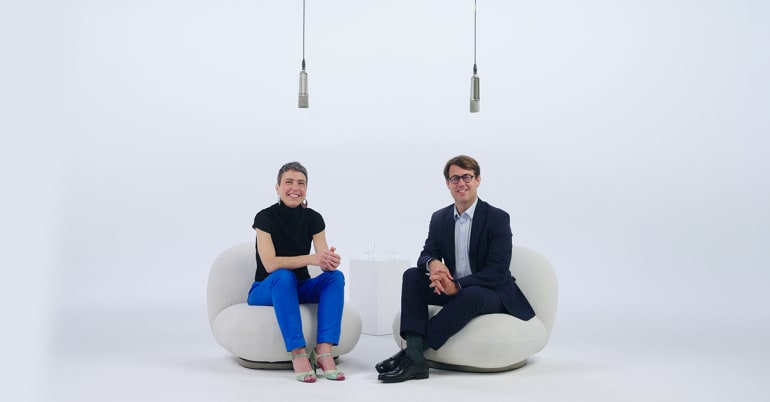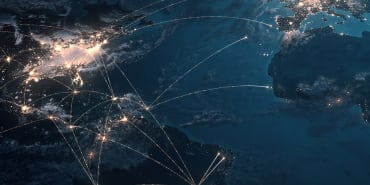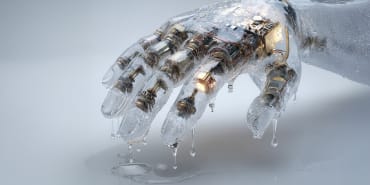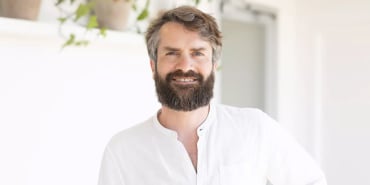Article published on “Voix d’entrepreneurs” in partnership with Le Figaro on 25 September 2025
In a world dominated by the climate emergency and geopolitical fragmentation, Marie Ekeland and Édouard de Saint Pierre present a bold alternative vision for finance.
Ekeland, founder of the evergreen fund 2050, invests in disruptive companies that are reinventing long-term economic models. Alongside her, de Saint Pierre, Managing Director of Lombard Odier in France, is working to embed finance within sustainable, measurable transition pathways. Together, they champion a pragmatic approach to finance that is firmly grounded in reality and designed to steer capital toward sustainable, ambitious, and strategic solutions for the future.
key takeaways.
- The evergreen fund 2050, founded by Marie Ekeland, supports innovative companies over the long term, measuring success by impact as well as financial performance
- Lombard Odier has developed proprietary tools to evaluate how portfolios align with climate goals and to track companies’ progress on their transformation journeys
- By supporting sustainable economic models, finance can play a pivotal role in transforming value chains and reducing carbon footprints.
Tell us about 2050, the evergreen fund you launched five years ago.
Marie Ekeland: I created 2050 with the firm belief that we must use technology to tackle major global issues, and that this calls for a fundamental rethink of our investment models. 2050 is an evergreen fund, which means that we are not bound by fixed exit horizons. This allows us to support companies over the long term, in line with the structural transformations they are undertaking.
We want to demonstrate that there is another way to invest, one that is better aligned with the long term, the realities on the ground, and the real impact. We currently manage more than EUR 135 million in assets and hold investments in 12 companies, including Withings, the French connected health specialist; Sweep, a platform that enables companies to manage their carbon and ESG data; Fifteen, a provider of bike-sharing fleets; and Tilli, a start-up specialising in clothing repairs and alterations. They all share the same ambition to reinvent more sustainable models that are anchored in useful innovation. We are also aiming to redefine performance to encompass not only financial profitability but also environmental impact, support for entrepreneurs and dialogue with the world of research.
2050 is an evergreen fund, which means that we are not bound by fixed exit horizons… We want to demonstrate that there is another way to invest, one that is better aligned with the long term, the realities on the ground, and the real impact
So where does finance sit in all of this? Can it really support or even accelerate this transformation over the long term?
Édouard de Saint Pierre: 2050 is a rather unique model, and one that perfectly illustrates this need to combine financial performance and impact. It represents a major change in the way we look at investment, and this is also reflected in the measurement tools we are creating.
At Lombard Odier, we have developed a number of tools, such as the ITR (Implied Temperature Rise) metric and the LOPTA (Lombard Odier Portfolio Temperature Alignment) benchmark. These enable us to evaluate the extent to which a portfolio is aligned with climate transition goals by projecting its impact on global warming.
We are interested not just in a snapshot of a company at a given moment, but in its trajectory and the progress of its transformation efforts
We are interested not just in a snapshot of a company at a given moment, but in its trajectory and the progress of its transformation efforts. In other words, it’s not solely about seeing where they are today, but about assessing their ability to travel in the right direction over the long term, which again is another way of rethinking performance.
Looking upstream, it is interesting to note that family investors are playing an increasingly important role in financing activities related to the environmental transition. As a group, these investors are able to take a long-term view and are increasingly in search of meaning.
Read also: Out of thin air: how Twelve is closing the carbon loop by turning emissions into products
What are the main trends that you are currently observing with regard to impact?
Marie Ekeland: The environmental emergency is the overriding priority today. Climate change, biodiversity loss, and rising sea levels are all critical signals that call for tangible responses. But the emergency also has an inherent social dimension, as the ecosystems that are in crisis often support entire local economies.
The example of Coral Vita embodies this holistic approach. The company, a pioneer in coral reef restoration, has developed innovative land-based coral farms where coral can be grown up to 50 times faster than in the sea. This coral is then reimplanted to restore damaged reefs, which are essential pillars of marine biodiversity. The restored reefs help preserve underwater life, including the local fisheries that are crucial for food security. They also form a natural barrier against adverse weather events, protecting infrastructure in ports and along coastlines. Coral Vita’s work is therefore profoundly beneficial at a local level, ecologically, economically and socially.
In the face of the current geopolitical upheaval, how can finance continue to play a leading role in the environmental transition?
Édouard de Saint Pierre: It has to be said that, in the current context, prioritising climate issues is a challenging exercise. Between geopolitical uncertainty, global fragmentation and market tensions, the temptation to put the environmental transition on the back burner is huge. However, these periods of turbulence are precisely the moments in which we must strengthen our convictions and invest in long-term solutions.
In the current context, prioritising climate issues is a challenging exercise. However, these periods of turbulence are precisely the moments in which we must strengthen our convictions and invest in long-term solutions
Calyxia offers a perfect illustration of this point. This French deep-tech firm develops biodegradable microcapsules to replace the omnipresent microplastics in sectors such as cosmetics, agriculture, and advanced materials. Its first industrial site became fully operational in 2023, and it is planning a second in Île-de-France with an annual capacity of 3,000 tonnes. Calyxia embodies the type of innovation that we have to be backing: a scientific solution with a measurable environmental impact that is economically viable and capable of transforming entire industrial systems.
Calyxia, the French start-up that wants to eliminate microplastics
This young industrial company is tackling microplastic pollution with patented biodegradable microcapsule technology. Founded in 2014 by Jamie Walters along with Jérôme Bibette and Damien Demoulin (ESPCI Paris) and David A. Weitz (Harvard University), it proposes sustainable alternatives that deliver twice the performance of conventional plastic capsules. The company's solutions have major applications in agriculture, cosmetics and cleaning products, and advanced materials. They help reduce the use of chemical ingredients, preserve the soil and limit the presence of plastic particles in the food chain. Its circular model plays a part in lowering CO₂ emissions by up to 90% and completely eliminating certain pollutants, such as isocyanates and formaldehyde.
With a huge capacity for innovation and an expanding portfolio of patents, the company's ambition is to become a key global player in the environmental transition. After securing USD 35 million through a series B investment round in September 2024, bringing the total funds raised since its foundation in 2015 to almost USD 70 million, the company is now forging ahead with its industrial and international rollout.
Read more: How Calyxia is leading the charge against microplastic pollution and transforming industries
What main quality do you believe the entrepreneur of tomorrow will need to have?
Marie Ekeland: What will set the entrepreneur of tomorrow apart is their capacity to define a clear course of action that is aligned with their fundamental beliefs. It is no longer just about managing a company, but about doing so in line with a long-term mission that is both personal and supported by the company’s structure.
With these principles as our lodestar, it follows that a further quality is essential: clarity. You must be able to eliminate complacency and identify the tensions running through the company, whether classic challenges such as trade-offs between impact and profitability or larger-scale systemic pressures, including geopolitical instability, technological competition, or climate issues. The ability to steer a course between short-term factors and the long-term vision, while taking into account the expectations of the stakeholders involved, is precisely what will shape the economic leaders of tomorrow.
The ability to steer a course between short-term factors and the long-term vision, while taking into account the expectations of the stakeholders involved, is precisely what will shape the economic leaders of tomorrow
Édouard de Saint Pierre: Yes, and I firmly believe that the role of a firm like ours is to create bridges between the ecosystems. The main weakness at present is that these stakeholders do not talk to each other, or at least not enough. You have family businesses, B Corp™ companies, mission-driven organisations and tech start-ups each advancing along its own corridor, whereas the solution will come from all of these ecosystems working together.
Family businesses, B Corp™ companies, mission-driven organisations and tech start-ups: to find the answers to major challenges, these worlds have to converge. Our role in this is clear: we need to create the bridges that will allow this to happen
To find the answers to major challenges, these worlds have to converge. Our role in this is clear: we need to create the bridges that will allow this to happen. We have to get these universes talking about issues relating to investment, transformation and long-term vision.





share.